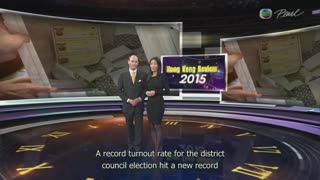Hong Kong review 2015
2015-12-31
1
"The Hong Kong Government proposed a rubber stamp of Beijing[U-2032]s stringent framework for the 2017 Chief Executive election that[U-2032]s a shoo-in for pro-establishment candidates. Government supporters insist it[U-2032]s the only way forward but pan democrats stand firm on vetoing the reform package. Both proponents and dissenters staged offensives to push their positions. Second before the vote in LegCo in June, pro-establishment lawmakers walked out, saying they wanted to beat the quorum to wait for Lau Wong-fat who was late. But a quorum of 37 legislators remained. The final score: 28 against, 8 in favour. The failed political reform proposals caused the pro-establishment camp great embarrassment and further scandal. And led to a split among pan-democrats, with some forming new centrist alliances. In November, the first district council polls after the Occupy Movement saw a number of emerging [U-2032]Yellow Umbrella Soliders[U-2032] being elected. Social order resumed after Occupy. 7 policemen are being prosecuted for allegedly beating up a protester. Police also scheduled arrests for Occupy Central leaders and other protesters. The social polarisation precipitated by Occupy persisted. Many universities withdrew from the Federation of Student Unions. Hong Kong University[U-2032]s (HKU) student union staged its own June 4th rally. At the traditional vigil in Victoria Park, some youths burnt the Basic Law. The year also saw more violent confrontations. In the scandal concerning the HKU Council and the appointment of Prof. Johannes Chan as pro-vice chancellor, students, teachers and alumni suspected Beijing[U-2032]s intervening hand. Some students stormed a Council meeting and later, when the Council rejected Chan[U-2032]s appointment, audio tapes of the confidential meetings were divulged in the media, resulting in a court injunction. In protests, whether against the MTRC[U-2032]s (Mass Transit Railway Corporation Limited) restrictions on large musical instruments or parallel traders, the Union Jack flag seems ubiquitous. And Hong Kong soccer fans booed the Chinese national anthem in World Cup qualifying matches. These incidents reflect the increasing contradictions between Hong Kong and the mainland. And the mainland and Hong Kong Government[U-2032]s worries over Hong Kong independence can be seen in the Chief Executive[U-2032]s policy address criticising the HKU students[U-2032] magazine [U-2032]Undergrad[U-2032] for advocating self-determination for Hong Kong, Beijing[U-2032]s unprecedented mention of Hong Kong & Macau in its issuance of national security laws, etc. In a bid to ease pressures from parallel traders and individual mainland travellers as well as other mainland-Hong Kong contradictions, came a change to the multiple-entry permit scheme for Shenzhen permanent residents visiting Hong Kong. New permits allow the visitors to make only one trip a week. This led to a downturn in the retail and hotel industries. Hong Kong[U-2032]s investors suffered when mainland stocks plunged after a bullish rally in April. Hong Kong[U-2032]s Exchange Fund registered historic losses of $63.8 billion. The year also saw many infrastructural projects exceed budgets or delayed. The government strived to reduced the number of impoverished people and introduce standard working hours. In July, the [U-2032]excess lead in drinking water[U-2032] scandal broke in Kai Ching Estate, engulfing 12 other public housing complexes, as well as schools. Doctors found too much lead in the blood can slow children[U-2032]s development. A probe found faulty piping led to the excess lead. Residents planned to sue for compensation while the government set up an inquiry and demanded contractors change problematic water pipes. This was quite a tumultuous year for Hong Kong[U-2032]s media industry. After 58 years in operation, Asia Television[U-2032]s broadcasting license will be terminated next April. Radio Television Hong Kong will take over ATV[U-2032]s (Asia Television Limited) analog spectrum. In September, ATV finally found a white knight to finance it but authorities have not approved the move. Late in the year, ATV[U-2032]s CEO (Chief Executive Officer) was fined for repeatedly failing to pay salaries and license fees. After losing money, Phoenix Radio returned its digital license to the authorities. DBC (Digital Broadcasting Corporation Hong Kong Limited) radio saw massive sackings. Among newspapers, the Hong Kong Daily News closed own after 56 years. And Sing Pao suspended publication for a while. This year also saw a $28 million ransom paid in a kidnap case and a daring watch shop robbery. But telephone scams topped the list of big bucks crimes. And after years of investigation, former Chief Executive Donald Tsang became the highest ranking government official to be sued by the ICAC (Independent Commission Against Corruption)"--TVB web site.
Videos View all







